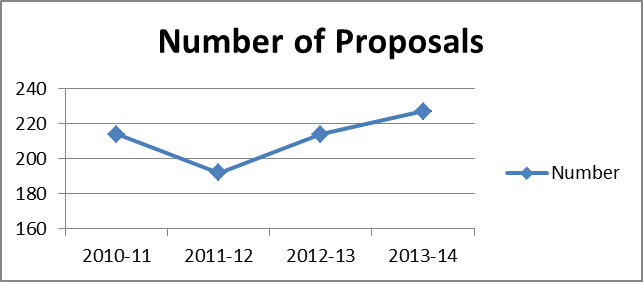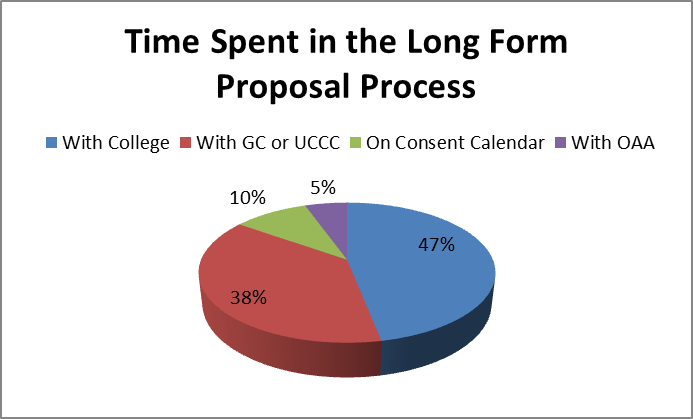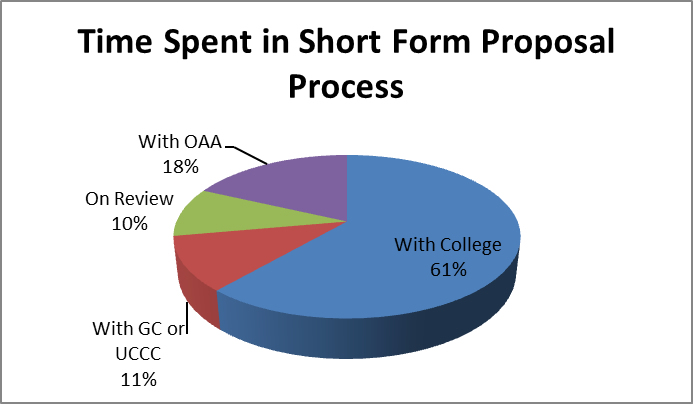Deadlines
|
Course and Curriculum Deadlines for 2024-2025 Catalogs Best to submit your proposals in early Fall semester. |
|
|---|---|
|
10/31/23 |
SUBMISSION DEADLINE (strongly recommended) for all course proposals. 'New Course' and 'Course Revision' proposals should be launched and approved by Originator via Curriculog by October 31st to help ensure final approval by the end deadline of March 15th. The likelihood of reaching final approval before the end deadline increases the earlier the proposal is started by the Originator. |
| 12/31/23 |
SUBMISSION DEADLINE for all course and curriculum proposals. Course and curriculum proposals should be launched and approved by Originator via Curriculog by December 31st to help ensure final approval by the end deadline of April 30th. Do not wait until submission deadline to submit! The likelihood of reaching final approval before the end deadline increases the earlier the proposal is started by the Originator. |
|
3/15/24 |
FINAL APPROVAL DEADLINE for course proposals. 'New Course' and 'Course Revision' proposals must reach the Banner Step by March 15th (for processing prior to start of Fall registration) in order to be scheduled/offered in Fall 2024. Late 'course revision' proposals will receive a Fall 2025 effective term. |
| 4/30/24 |
FINAL APPROVAL DEADLINE for all course and curriculum proposals. Course and curriculum proposals must reach the Banner Step by April 30th (for processing prior to Catalog publication) to receive a Fall 2024 effective term and appear in the 2024-2025 Undergraduate or Graduate Catalog. Late proposals will receive a Fall 2025 effective term. |
| 6/1/24 |
2024-2025 Undergraduate Catalog posted online. Only timely course and program proposals will be included. Late proposals will be included in the 2025-2026 Catalog instead. |
|
6/15/24 |
2024-2025 Graduate Catalog posted online. Only timely course and program proposals will be included. Late proposals will be included in the 2025-2026 Catalog instead. |
A Note Regarding Other Timing Considerations: As you plan for curriculum changes, please be aware of other agencies outside of UNC Charlotte that will likely add time before the curriculum change can be implemented. New site locations, site closures, and new degree, certificate, joint degree, and dual degree programs may require approval from the UNC System Office, SACSCOC, and/or the U.S. Department of Education. These notifications/approvals can take several additional months and vary by the type of curricular modification. Originators will be contacted during the curriculum review process via Curriculog if additional notifications/approvals are necessary.
Frequently Asked Questions
General
What items in the Catalog need to be approved by the faculty through Curriculog?
According to the Constitution of the Faculty, the faculty has primary responsibility for degree requirements, admission standards, curricula and new program development. For academic departments and colleges, degree requirements, programs, and courses require faculty approval at various levels. This is necessary to allow faculty review of changes within their purview, to ensure that changes do not impact curricula, resources, or students in unanticipated ways, and to provide necessary notification to appropriate offices and units following modifications (i.e. Office of Registrar, Office of Admissions, advisors, etc.). Click here for a list of items that must be approved by the faculty through Curriculog.
How do I propose a new degree program?
Information on the process for proposing a new degree program can be found on the Office of Academic Affairs site.
What is the responsibility and authority of the faculty curriculum committees (department-level, college-level, and university-level including Undergraduate Course and Curriculum Committee and Graduate Council)?
The responsibilities and authority of the faculty curriculum committees can be found here.
What is the responsibility and authority of the Office of Academic Affairs in this process?
The Office of Academic Affairs is responsible for analyzing, facilitating, monitoring, and approving proposed changes and the implementation of those changes as approved by governing bodies. In addition, while the faculty curriculum committees are responsible for curriculum development and maintenance, many changes to curriculum have resource implications. The Office of Academic Affairs has oversight over the distribution of resources as well as a role in monitoring curriculum changes that impact overall enrollment and student outcomes at the institution as well as our relationships with partners (including transfer institutions). Click here for a list of the responsibilities and authority of the Office of Academic Affairs related to curriculum.
Why should I inactivate a course?
If a course is no longer being used and there are no plans to offer it in the foreseeable future, the course should be inactivated.
How many course and curriculum changes are made annually?
During the 2013-2014 academic year, a total of 227 proposals were approved, a 6% increase over the previous year. The chart below details the number of course and curriculum proposals that have been processed since 2010. It is notable, however, that this only reflects the total number of proposals, not the total number of changes; our former process of Short Forms and Long Forms allowed for multiple changes to be made on a single proposal.

How long does the average course and curriculum proposal take to gain approval through the current process?
During the 2013-2014 academic year, the average Long Form (major changes) took over 5 months (174 days) from the time of origination to the time of approval; the average Short Form (minor changes) took over 3 months (102 days). The graphs below show that the majority of time is on the creation and review process, both in the colleges and at the Graduate Council and/or Undergraduate Course and Curriculum Committee.


Curriculog
What is Acalog and Curriculog?
Acalog is the catalog management system, and Curriculog is the curriculum management system. These two systems will work together and integrate with our student information system (Banner) to ensure accuracy of our program requirements, course descriptions, and related degree information.
How do I get access to Curriculog?
All UNC Charlotte faculty are granted access to originate a proposal in Curriculog using your NinerNet credentials. The URL is http://charlotte.curriculog.com. If you are having difficulties accessing the system, or have questions about your role as an approver, please contact FacultyGovernance@uncc.edu.
How do I request a change to my role(s) or my committee assignments in Curriculog?
If your role or committee assignment change is not reflected in Curriculog, then contact the Faculty Governance Assistant one of three ways: 1) by completing webpage form; 2) by email at facultygovernance@uncc.edu; or 3) by phone at 7-5719.
Why is Curriculog necessary?
At UNC Charlotte, we had developed well-meaning processes and systems for managing our curriculum – the efficiency and utility of which had been lessened as the institution has grown and become more complex. Processes for course and curriculum approvals, catalog publication and maintenance, and class registration were overly complex, incredibly time-intensive, and unnecessarily paper-driven. Acalog/Curriculog will help in reducing and eliminating the inefficiencies, inconsistencies, and other problems associated with th former system while providing faculty, departments, colleges, and staff the ability to access, edit, and propose changes to curriculum in a simple, effecient way.
How does Curriculog work?
Curriculog includes a set of forms and routing processes that reflect the information gathered and the routing of the former Short Form and Long Form. With Curriculog, you choose the form based on the type of action you wish to do (i.e. create a new course, make changes to an existing program), and once the form is complete, it will be routed to the approvers in the queue. When the proposal is approved, it automatically loads into Banner and will be ready for the next version of the catalog.
How does Curriculog align with the other curricular initiatives at the University?
The implementation of Acalog/Curriculog is a key component to our Student Success Core Initiatives, aimed at improving the student experience and bolstering student retention and degree completion as well as our Graduation Initiative, a multi-step effort designed to clarify degree requirements and help students navigate their curriculum. The curricular components of these initiatives involve a comprehensive effort to clarify degree requirements and expectations for students and to identify and mitigate barriers to successful graduate both in terms of program design and student performance. Acalog/Curriculog serves to organize courses and curriculum in a central database which will then serve as a repository to generate other related documents such as: Academic Plans of Study, Degree Maps, and Degree Audit.
Who was involved in the development of Curriculog?
This project was guided by an Academic Advisory Team which included representation from each of the academic colleges as well as three standing committees of the Faculty Council: Undergraduate Course and Curriculum Committee, Graduate Council, and Faculty Information and Technology Services Advisory Committee. The Academic Advisory Team served as the primary contact and guided the project through conceptualization and development by considering policy and procedural implications.
How was Curriculog selected?
An RFP (Request for Purchased) was prepared and issued by the Office of Academic Affairs and Information and Technology Services (ITS). The Academic Advisory Team evaluated the six proposals received and recommended two vendors for on-campus presentations. Presentations to campus were conducted in March 2014. Following feedback received from those who attended presentations and after extensive reference checking from peer institutions both within the UNC system and nation-wide, the Academic Advisory Team recommended the purchase of Acalog/Curriculog.
When did Curriculog go live?
Curriculog was launched Spring 2016 campus-wide.
What other institutions use Curriculog?
Acalog and Curriculog are used nationally by hundreds of institutions including large, research institutions such as: University of Virginia, Cornell University, Kansas State University, Louisiana State University, and the University of Tennessee. Within the UNC system, the products are currently used by: University of North Carolina at Wilmington, Winston-Salem State University, and East Carolina University.
How-To and Best Practices
How to email or custom route a proposal
If wanting to share a launched proposal with another there are two methods: email the proposal or custom route the proposal. Email the proposal if wanting to invite someone to view the proposal only. Custom Route the proposal if wanting to add someone to the official approval process and have approval/rejection authority. Click here for instructions for each method (PDF Document).
Training
How can I get trained?
User guides, training videos, and information on in-person training for Curriculog are available on the Curriculog Training Resources site.
I have a question. Who do I contact for help?
You may contact the Faculty Governance Assistant.
Course and Curriculum Timing and Deadlines
Can proposals be submitted throughout the year?
Yes, proposals can be submitted any time throughout the year, but will be implemented according to the established deadlines.
Can changes continue to be made through the Spring semester for implementation the following Fall?
All changes, regardless of size and scope, must follow the established deadlines for the process to be effective. Proposals can continue to be submitted to the UCCC/Graduate Council throughout the academic year, and they will be approved for implementation based on the date approved. Revisions to courses and curriculum approved prior to registration of classes for a term can be effective for that term. New courses and curriculum approved prior to classes end for a term can be effective for that term. If there is a reason for a valid reconsideration, a justification should be submitted to the Faculty Governance Assistant, who, with consultation with the Registrar, will make the final decision as to the implementation date. Proposals approved after the published deadline date (June 1st) will not be published in the Catalog until the subsequent Catalog edition.
Can Special Topics courses continue to be added through the Spring semester for implementation the following Fall?
Yes, Special Topics courses can continue to be added as necessary, but based on the timing of the proposal may not appear in the Catalog until the subsequent Catalog edition. This reflects no change from current practice.
Why are course and curriculum process deadlines necessary?
At UNC Charlotte, we have developed well-meaning processes and systems for managing our curriculum – the efficiency and utility of which have been lessened as the institution has grown and become more complex. The establishment of deadlines for the course and curriculum process helps to eliminate several reoccurring problems. First, with no existing deadlines, departments and colleges do not know when to plan, make changes, or when to expect a response. Second, the lack of a timeline shows disregard for Office of the Registrar deadlines; once registration has started for a given term, you cannot make changes to courses. Finally, set deadlines with Catalog changes once a year are most transparent for students and advisors who use the Catalog to plan their course schedules.
When did the course and curriculum deadlines begin?
During the 2012-2013 academic year, the UCCC piloted a set of guidelines and deadlines for course and curriculum proposals. The deadlines were described as helpful in providing guidance to departments and colleges as well as working to increase the level of transparency about the course and curriculum review process. It was recommended that departments and colleges establish corresponding processes and deadlines within their department and collegiate review. With the development of Curriculog in 2016, the deadlines are recommended campus-wide.
What process was used to consider the establishment of deadlines?
Consultations and discussions occurred with the UCCC, Graduate Council (GC), and Associate Deans. In addition, a survey was conducted of peer institutions, both within the University of North Carolina system and beyond, which revealed that annual curriculum and Catalog changes are the norm, not the exception.
Additional Questions
► Additional questions can be directed to the Faculty Governance Assistant who will, as needed, forward them to the appropriate chair.